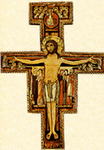St. Nicholas of Myra -- Model of Charity and Promoter of Justice
 Today, 6 December, the Christian community throughout the world celebrates the memory of our Holy Father Nicholas, Bishop of Myra.
Today, 6 December, the Christian community throughout the world celebrates the memory of our Holy Father Nicholas, Bishop of Myra.
Having lived and served in what is today Turkey, his bones are now interred in Bari, Italy (a rather convoluted history).
St. Nicholas, the "inspiration" for what we call "Santa Claus" and in other countries "Father Christmas" or "Papa Noel", is also a model of charity and a promoter of justice.
Among the most famous of the stories of his life and ministry in 4th century Asia Minor was the rescue he performed -- quietly, behind the scenes -- of the three daughters of an older man who had fallen into financial ruin. As payment for his debt he was going to be forced to hand his three daughters over to prostitution. The holy bishop got wind of it and, under the cover of night, placed three bags of gold secretly for the older gentleman to spare his daughters.
A lesser known story about St. Nicholas was that he had been a confessor (i.e. one who confessed one's faith through persecution without having suffered martyrdom [e.g. imprisonment, torture]) during the last empire-wide persecution under Emperor Diocletian. When Constantine ascended the throne and issued his famous Edict of Milan in AD 313 it paved the way for Christians to worship freely and openly practice their faith.
However, there was also another looming issue in the Roman Empire, especially in the East, and this was the Arian heresy (the priest Arius of Alexandria basically taught a doctrine of Christ that amounted to a denial of his full divinity).
At the First Ecumenical Council at Nicea in AD 325 the Council Fathers consented to a Creed (called the Nicene Creed, and later ratified at the Second Ecumenical Council in Constantinople in AD 381) that definitively address Christian faith. This is what we in the Catholic and Orthodox Churches profess at our Sunday Eucharists. They also condemned Arius and his doctrine.
According to one tradition, the holy Nicholas of Myra stood up and approached the preist Arius and then slapped him on the cheek and so condemned him! While we wouldn't find that particularly "ecumenical" and certainly not polite in our 21st century Western culture today, it is important to remember that St. Nicholas lived in a different culture, a different time and a different era in human history, even Christian history.
His charity and his justice are demonstrated in his faithfulness to the truth of the Gospel, his ecumenicity with the entire Church and his pastoral foresightfulness in responding to a very unjust situation afflicting his flock that would have led one of his people to submit to trafficking in the sexual exploitation of women -- prostitution.


No comments:
Post a Comment